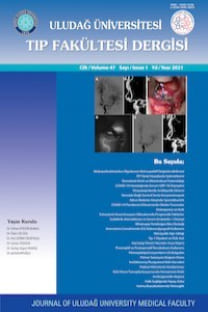Sıçanların bazı dokularında glukoz 6-fosfat dehidrogenaz ve malat dehidrogenaz aktiviteleri üzerine dinitro-o-krezol'ün etkisi
The effect of dinitro-o-cresol on glucose-6-phosphate dehydrogenase and malate dehydrogenase
___
- 1. Gasiewiez TA. Nitro compounds and related phenolic pesticides. In: Hayes WJ Jr.& Laws ER Jr ed. Hand book of pesticide toxicology. Academic Press, San Diego, CA. 1991; 3: 1191-269.
- 2. Sultatos LG. Mammalian toxicology of organophosphorus pesticides. J Toxicol Environ Health 1994; 43: 271-89.
- 3. WHO. Environmental Health Criteria Series 220: Dinitro-ocresol. World Health Organization, Switzerland: Geneva, 2000.
- 4. Kreczko S, Zwierz K, Jaroszewicz K. Glycoprotein biosynthesis by the guinea pig liver in chronic 4,6-dinitroortho- cresol poisoning. Acta Biol Acad Sci Hung 1974; 25: 167-71.
- 5. Van den Berg KJ, van Raaij JGAM, Bragt PC, Notten WRF. Interactions of halogenated industrial chemicals with transthyretin and effects on thyroid hormone levels in vivo. Arch Toxicol 1991; 65: 15-9.
- 6. Mehta A, Mason PJ, Vulliamy TJ. Glucose-6-phosphate dehydrogenase deficiency. Bailliers Best Pract Res Clin Haematol 2000; 13: 21-38.
- 7. Wood T. Distribution of the pentose phosphate pathway in living organisms. Cell Biochem Funct 1986; 4: 235-40.
- 8. Lehninger AL, Nelson DL, Cox MM. Principles of biochemistryWorth Publishers, USA 2000; 743-4,
- 9. Levy HR. Glucose-6-phosphate dehydrogenases, in: Meister A (ed). John Wiley and Sons Inc, New York, 1979; 97-191.
- 10. Mishra R, Shukla SP. Endosulfan effects on muscle malate dehydrogenase of the freshwater catfish Clarias batrachus. Ecotoxicol Environ Saf 2003; 56: 425-33.
- 11. Bradford MM. A rapid and sensitive for the quantitation of microgram quantitites of protein utilizing theprinciple of protein- dye binding. Anal Biochem 1976; 72: 248-54.
- 12. Boehringer Mannheim, GmbH. Biochemica information I, 1973; MDH: 124, G6PD: 99.
- 13. Moczon T. Inhibitory effect of pesticides on phosphate and acetylcholinesterase activity in miracidia of Fasciola hepatica. Histochemical Data. Bull Acad Pol Sci Biol 1976; 24: 289-92.
- 14. Dahamna S, Sekfali N, Walker CH. Biochemical indicators of hepatic effects of pesticides.Commun Agric Appl Biol Sci 2004; 69: 821-8.
- 15. Gomez-Gallego F, Garrido-Pertierra A, Mason PJ, Bautista JM. Unproductive folding of the human G6PD-deficient variant A-. FASEB J 1996; 10: 153-8.
- 16. Dere E, Yanıkoğlu A. Endosülfan ve 2,4-D’nin Swiss-Albino (Mus musculus) farelerinin karaciğer ve böbreğinde bazı enzimlerin aktivitelerine etkisi. Doğa Turk J Biol 1993, 17. 163-73.
- 17. Dere E, Bakır S, Atalay A. Malthion’un fare (Mus musculus) karaciğer hekzokinaz, glukoz 6-fosfat dehidrogenaz, malat dehidrogenaz ve laktat dehidrogenaz aktivitelerine etkisi. Turk. J Biol 1995a,; 19: 19-27.
- 18. Dere E, Bakır S, Atalay A. Fare (Mus musculus) böbrek ve ince bağırsak hekzokinaz, glukoz 6-fosfat dehidrogenaz, malat dehidrogenaz ve laktat dehidrogenaz aktivitelerine malathion’un etkisi. CÜ Tıp Fak Derg 1995b; 17:, 167-74.
- 19. Den Tonkelear EM, Van Leeuwen FXR, Kuiper C. Semichronic toxicity testing of DNOC in the rat. Meded Fat Landbouwwet Rijksuniv Gent 1983; 48: 1015-22.
- 20. Yılmaz HR, Yüksel E. Effect of 2,4-dichlorophenoxyacetic acid on the activities of some metabolic enzymes for generating pyridine nucleotide pool of cells from mouse liver. Toxicol Ind Health 2005; 21: 231-7.
- 21. Krebs HA, Eggleston LV. The regulation of the pentose phosphate cycle in rat liver, 12, 421-433 in: Weber G (ed). Adv enzyme regul. Oxford: Pergamon Press Ltd. 1978.
- 22. Agency for Toxic Substances and Disease Registry (ATSDR). U.S. Department of Health And Human Servıces, Public Health Service. Dinitrocresols, 1996.
- 23. Sivapiriya V, Jayanthisakthisekaran, Venkatraman S. Effects of dimethoate (O,O-dimethyl S-methyl carbamoyl methyl phosphorodithioate) and ethanol in antioxidant status of liver and kidney of experimental mice. Pestic Biochem Phys 2006; 85: 115–21.
- 24. Zhang Z, Apse K, Pang J, Stanton RC. High glucose inhibits glucose-6-phosphate dehydrogenase via cAMP in aortic endothelial cells. J Bıol Chem 2000; 275: 40042–47.
- 25. Bizouarn T, Fjellström O, Meuller J, Axelsson M, Bergkvist A, Johansson C, Karlsson G, Rydström J. Mechanism of action deduced from its structural and catalytic properties. Biochim Biophys Acta 2000; 1457: 211–28.
- 26. Jackson JB, White SA, Quirk PG, Venning JD. The alternating site, binding change mechanism for proton translocation by transhydrogenase. Biochemistry 2002; 41: 4173-85.
- 27. Dodds EC, Robertson JD. The clinical applications of dinitro-ocresol. Lancet 1933; 21: 1137-9.
- 28. Lawford DJ, Kıng E, Harvey DG. On the Metabolism of Some Metabolic Fate of DNOC. II. Biotransformation in Mammals. Med Fac Laundbouww Rijksuniv Gent 1954; 47: 401–8.
- 29. Jastroch W, Knoll W, Lange B, Riemer F, Thiele E. Results of a Study on the Exposure of Agriculture Workers to DNOC. Z Ges Hyg 1978; 24: 340-3.
- ISSN: 1300-414X
- Yayın Aralığı: 3
- Başlangıç: 1975
- Yayıncı: Seyhan Miğal
Kalp Yetmezliğinde Kromogranin A
Egemen DERE, Ferda ÖZDİKİCİOĞLU, Hakan TOSUNOĞLU
Vajinal Akıntıya Hastaların Yaklaşımı
Sıçanlarda Pilocarpin ile Oluşturulan Epilepsi Modelinde Topiramat'ın Antikonvulsan Etkileri
Propofol ve Deksmedetomidin Sedasyonunun Göz İçi Basıncı Üzerine Olan Etkilerinin Karşılaştırılması
Ayhan KALYONCU, Gülsen KORFALI, Belgin YAVAŞCAOĞLU, Mehmet BAYKARA
İzole Renal Kist Hidatik, Karaciğer Kist Hidatiği Görüntüsü Verebilir
Ela PAKSOY, Ersin ÖZTÜRK, Sadık KILIÇTURGAY
Müren MUTLU, M. Sadık BİLGEN, Kemal DURAK
Preterm Erken Membran Rüptürü Olan Gebelerde Kliniğimizin Perinatal Sonuçları
Yalçın KİMYA, Nebahat UYSAL, Candan CENGİZ
Klamidya Enfeksiyonlarında Azitromisin
İleri Yaş Ayrılmış Femur Boyun Kırıklarında Unipolar ve Bipolar Protez Uygulamaları
